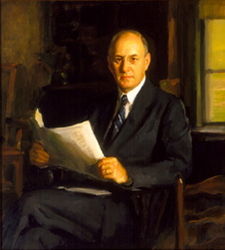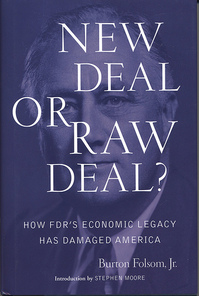
Henry Morgenthau, Jr.
Source of portrait: http://en.wikipedia.org/wiki/Henry_Morgenthau,_Jr.
Henry Morgenthau, Jr. was FDR’s Secretary of the Treasury from 1934-1945. In the following important quote, he admits that the big New Deal stimulus spending programs had failed.
(p. 2) We have tried spending money. We are spending more money than we have ever spent before and it does not work. And I have just none interest, and if I am wrong . . . somebody else can have my job. I want to see this country prosperous. I want to see people get a job, I want to see people get enough to eat. We have never made good on our promises. . . . I say after eight years of this administration we have just as much unemployment as when we started . . . . And an enormous debt to boot!
Source:
Folsom, Burton W., Jr. In New Deal or Raw Deal? How FDR’s Economic Legacy Has Damaged America. 4th ed. New York: Threshold Editions, 2008.
(Note: ellipses in Folsum’s version of the quotation.)
Folsum says that this statement was from testimony before the House Ways and Means Committee in May 1939; and can be found in Morgenthau’s Diary entry for May 9, 1939 at the Roosevelt Presidential Library.
Source of book image: http://www.flickr.com/photos/roscoe/3121498653/



I think that a fuller version of the quote is found in Blum, “From The Morgenthau Diaries — Years of Urgency 1938-1941” at pp. 24-25 The portions ommitted by Folsom are in brackets:
We have tried spending money. We are spending more money than we have ever spent before and it does not work. And I have just none interest, and if I am wrong . . . somebody else can have my job. I want to see this country prosperous. I want to see people get a job, I want to see people get enough to eat. We have never made good on our promises. . . . [We have said we would give everybody a job that wanted it. We have never taken care of the people . . . . there are four million that don’t have that much income. We have never done anything for them . . . We have never begun to tax the people in this country the way they should be . . . . People who have it should pay. . . . It’s never a good year to have a tax bill, but I think it’s a darn good year to begin to balance the budget. . . . the biggest deterrent of all . . . is that the country does not know when the end is in sight and this unbalancing of the budget . . . that’s what frightens people.] I say after eight years of this administration we have just as much unemployment as when we started . . . . And an enormous debt to boot!
Are there any serious economists or historians who understand economics who still credit the New Deal with pulling America out of the Great Depression. The statistics of unemployement rates throughout the 1930’s should be sufficient to put that myth to rest.
Are there any serious economists or historians who understand economics who still credit the New Deal with pulling America out of the Great Depression. The statistics of unemployement rates throughout the 1930’s should be sufficient to put that myth to rest.
Massive government spending does pull economies from a depression. The problem with the New deal is that it was 10 times too small. What does everybody think WW2 was? It was government spending and stimulus on a massive level. It thrust us from the depression and most of that money went to unproductive war. Imagine if all that money had gone to education, R&D, infrastructure, and retrofiting of buildings what it would have done for our country. The problem with the new deal and now the stimulus of 2009 is they were drastically too small. WW2 showed you can have massive government spending to stimulate an economy.
Massive government spending does pull economies from a depression. The problem with the New deal is that it was 10 times too small. What does everybody think WW2 was? It was government spending and stimulus on a massive level. It thrust us from the depression and most of that money went to unproductive war. Imagine if all that money had gone to education, R&D, infrastructure, and retrofiting of buildings what it would have done for our country. The problem with the new deal and now the stimulus of 2009 is they were drastically too small. WW2 showed you can have massive government spending to stimulate an economy.
Economic depression? Let’s have a war! Brilliant, just brilliant.
Government spending when used for central planning and control of the economy and social engineering is always doomed to the law of unintended consequences. Invariably it is done because citizens simply aren’t doing what they think they should be doing. Adam Smith’s ‘invisible hand’ is guiding their daily interactive decisions with the economy, and that is simply not to be allowed. Some bureaucrat or lobbyist-influence politician who wants to decide where limited resources will be directed wiil cause shortages in things that the market supply & demand economy might/usually otherwise choose, and oversupply in things people don’t want. Look at the federal intervention from the mid 1990s to 2008’s housing bubble explosion. Increasingly, regulations mandated and made it easier for anyone to buy a home, and one that by the mid 2000s was clearly inflated far above historic market value. There was a $3 trillion gap between the trends in house price appreciation where it tracked slightly above the cpi until that time. A look at a graph made clear what had to happen. There were warnings and they were ignored. Recently the Biden adminsitration has touted how Moody’s has evaluated their infrastructure bill (80% non-infrastructure) will add 18 million jobs. Transportation Secretery Budejug later had to admit that all but 2.3 million would have happened anyway. I believe that works out to $800,000 per new job. You have to assume that to be true based on Moody’s. Don’t forget it was their fraudulent ratings of the securities made up of all those inflated home mortages that caused millions to purchase the worthless secuities in the first place (Standard and Poors did the same thing – and of course – no one went to jail).
The new deal was full of this type of unexpected and unintended result.
Read F.A. Hyek’s ‘Road to Serfdom’, written in the 1940s, pub in 1946 in the U.S. and Milton Freidman’s introduction of the 50th anniversary reprint. No one understood and wrote more clearly about the history and reality of socialism and the central planned economy. He clearly demonstrates that there is no such thing as Democratic Socialism. It’s a canard that papers over the transition from our federal form or the parliamentary version on the way to totalitarianism.
A chilling part of this book refers to reference to a report done in the early 30s (Doughterty Commission – quote from book follows). It is Harold Laski’s quotes about the conclusions of the report on the problems in getting new Socialist agenda through parliment (he says that they’ll have to figure out a way around regular rules of order – today the dems are working on that by trying to eliminate the filibuster and pack the court). He later quotes Laski in regards to the need to insure the socialists are not turned out from parliment by those pesky rules (2021 dems HR1 election nationalization and a horde of other methods):
Hyek road to serfdom – https://ctheory.sitehost.iu.edu/img/Hayek_The_Road_to_Serfdom.pdf PG 65 & 66
More recently, Professor Laski has elaborated the argument:
It is common ground that the present parliamentary machine is quite unsuited to pass rapidly a great body of complicated legislation. The National Government, indeed, has in substance admitted this by implementing its economy and tariff measures not by detailed debate in the House of Commons but by a wholesale system of delegated legislation. A Labour Government would, I presume, build upon the amplitude of this precedent. It would confine the House of Commons to the two functions it can properly perform: the ventilation of grievances and the discussion of general principles of its measures.
Its Bills would take the form of general formul~ conferring wide powers on the appropriate government departments; and those powers would be exercised by Order in Council which could, if desired, be attacked in the House by means of a vote of no confidence. The necessity and value of delegated legislation has recently been strongly reaffirmed by the Donoughmore Committee; and its extension is inevitable if the process of socialisation is not to be wrecked by the normal methods of obstruction which existing parliamentary procedure sanctions.
And to make it quite clear that a socialist government must not allow itself to be too much fettered by democratic procedure, Professor Laski at the end of the same article raised the question “whether in a period of transition to Socialism, a Labour Government can risk the overthrow of its measures as a result of the next general election”-and left it significantly unanswered. 2
* * * * *
I S. and B. Webb, Industrial Democracy, 1897, p. 800, footnote.
2 H. J. Laski, “Labour and the Constitution”, The New Statesman and Nation, No. 81
(New Series), Sept. 10th, 1932, p. 277. In a book (Democracy in Crisis, 1933,